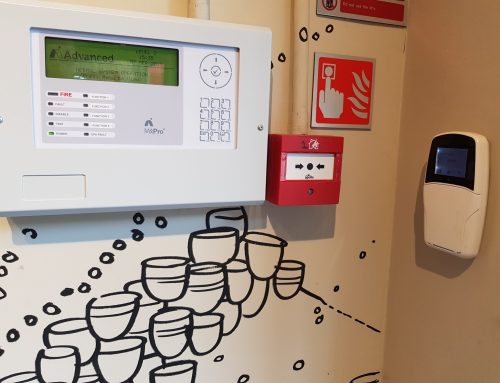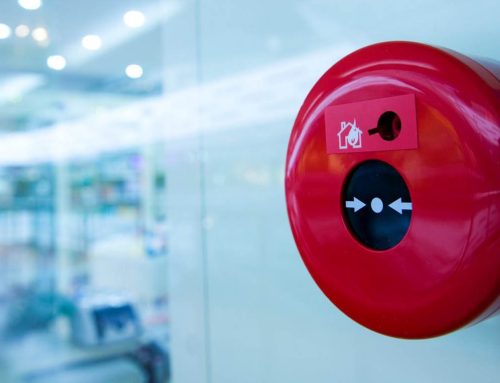A smoke detector going off randomly can be a nuisance and very stressful. The good thing is there are a few things you can try to fix the problem by yourself. But, before taking any steps, it’s important to know why your smoke detector keeps going off. This will help you to know what to look for when trying to fix the issue.
First, if there is actually fire in the area, then you will need to evacuate immediately and call the fire department. Do not try to disable the alarm, as this could put you in danger. Always remember, you have only 2 minutes to evacuate safely.
There is no fire visible but only smoke? Try to identify the source of the smoke. If it is coming from an appliance, such as a stove top or oven, then you will need to have it serviced by a professional. Do not use the appliance until it has been serviced.
If the smoke or fire is coming from something else, such as an electrical outlet or wiring, then you will need to call an electrician to come and take a look. Do not attempt to fix the issue yourself, as this could be very dangerous.
A malfunctioning smoke detector can be a result of poor manufacturing, smoke detector sensitivity, or external factors that can disrupt the performance of the device and trigger false alarms. The sound of the alarm is designed to catch your attention, but if it’s happening when there’s no actual emergency, this can be both frightening and frustrating.
There are five approaches you can try to help figure out why your smoke detector is going off for no reason and how to stop it.
1- Reset the detector
When you’re certain the coast is clear and there’s no smoke or fire, put your fingers in your ears and head back inside for some detective work. If you have battery-operated smoke alarms that aren’t hard-wired into your home’s electrical system, it’ll be easy to find the offending one, because only one will be sounding. When you locate it, press and hold the unit’s reset switch.
If the reset button doesn’t do the trick, take the alarm down and remove the batteries.
If your smoke detector has a long-life lithium battery that can’t be removed, wrap it in a blanket or stick it in the freezer until it stops beeping.
If you have hard-wired smoke alarms, you’ll soon discover they behave like Christmas lights: If one goes off, they all go off. That can make it maddening to figure out which one started the problem. Trying pressing the reset switch on every unit until the alarms stop. If that doesn’t work, head to your breaker box, and try flipping the switch off and then back on.
As a last resort, disconnect each alarm from the system and remove its batteries until the noise stops.
2- Weak Battery – Check the battery and replace it.
People often change the battery when they move into the house and then never touch it after that. A dead battery usually causes a chirping smoke detector and have a red flashing light. Batteries are known to weaken over time, causing a chirping alarm. Many people sync this up with daylight saving time as an easy way to that you replace batteries.
2- Dust Build-up – Clean the detector.
One of the most common reasons for a smoke alarm to go off repeatedly is that it’s dusty. This can happen if the room where the smoke alarm is located is not often cleaned or dusted. The dust build-up interferes with the sensor’s ability to detect smoke, and causes it to go off even when there’s no fire. To clean your smoke detector, use a vacuum with a soft brush attachment to gently remove any dust from the sensor. You can also use a can of compressed air to blow away any dust particles. To make sure a dust build-up isn’t the cause, you should try to clean out your smoke detectors regularly.
It’s disgusting but true: insects can get trapped in the chambers inside of a smoke detector.
This is more common in homes that are located in areas with a lot of trees or other vegetation. If you live in an area with a lot of insects. To prevent this from happening, make sure that your smoke detector is installed in an area that is not prone to insects, and you may want to consider using a different type of smoke detector. The new ones have more modern sensors, which are able to better avoid getting triggered by dust, moisture or insects.
4. Placement of the detector
You can put smoke detectors in any room in your home, but where you put them could be the problem with your false alarms.
It doesn’t take a lot of smoke to trigger the alarm. If your smoke detector is within 10 feet of a cooking appliance such as your stove, toaster, or toaster oven, then this may be the cause of your false alarms.
Steam from your home and humidity from outside work similarly to burned food. Steam can block the flow of the current, just as smoke does.
Actually, the second most common cause of false positives is having your smoke detector too close to your bathroom.
Another reason for false alarms is chemicals near by. Smoke detectors are also sensitive to particles in the air that are released by strong-smelling chemicals. If you’re remodeling your home, deep cleaning, or using strong chemicals for another reason, this may be a cause of your false alarms.
Fireplaces can also cause smoke detector false alarms. Your fireplace can sometimes send smoke into your house, which sets off the alarm. This isn’t the alarm’s fault, though. Your chimney may not be clean, and the dampers may not be properly set. Hire a chimney sweep if your fireplace sends smoke into your home.
5- Consider replacing the detector
If none of the above helps, there’s a chance the smoke detector itself is damaged. If you’ve had a ton of false alarms in just one room, you should probably replace that particular unit. Similarly, if some of your detectors but not others have been triggering, you should replace them one at a time.
If your smoke detector goes off frequently, it’s important to have it checked by a professional. There may be something wrong with the unit that needs to be fixed. In that case we are here for you. Contact us today and get your smoke detectors serviced by a BAFE registered and NICEIC approved fire alarm company, EFE Fire & Electrical Ltd.






